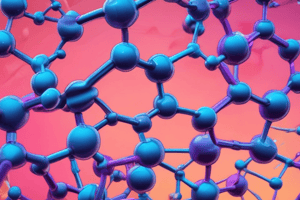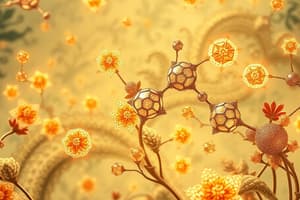Podcast
Questions and Answers
Which type of compounds contain six or more carbon atoms connected through alternating double bonds?
Which type of compounds contain six or more carbon atoms connected through alternating double bonds?
- Alkanes
- Aromatic hydrocarbons (correct)
- Alkynes
- Alkenes
What functional group is represented by -OH in organic chemistry?
What functional group is represented by -OH in organic chemistry?
- Amines (-NH2)
- Acids (-COOH)
- Alcohols (-OH) (correct)
- Ethers (-OR)
What type of reaction involves the removal of two atoms or groups from a molecule?
What type of reaction involves the removal of two atoms or groups from a molecule?
- Elimination (correct)
- Addition
- Substitution
- Rearrangement
Which area benefits from drug design requiring knowledge of organic synthesis methods?
Which area benefits from drug design requiring knowledge of organic synthesis methods?
What type of compounds are used to develop biomedical devices and high-performance coatings?
What type of compounds are used to develop biomedical devices and high-performance coatings?
What catalyzes organic reactions involving the breaking and making of covalent bonds?
What catalyzes organic reactions involving the breaking and making of covalent bonds?
What is the primary focus of organic chemistry?
What is the primary focus of organic chemistry?
What event is credited with coining the term 'organic chemistry'?
What event is credited with coining the term 'organic chemistry'?
Which of the following is NOT a key structural feature of organic compounds?
Which of the following is NOT a key structural feature of organic compounds?
What is the primary reason for the unique properties of organic compounds?
What is the primary reason for the unique properties of organic compounds?
Which class of organic compounds consists only of carbon and hydrogen atoms linked by single bonds?
Which class of organic compounds consists only of carbon and hydrogen atoms linked by single bonds?
What was the initial focus of organic chemistry before the development of synthetic methods?
What was the initial focus of organic chemistry before the development of synthetic methods?
Flashcards are hidden until you start studying
Study Notes
Organic chemistry is a fundamental branch of chemistry concerned with the study and application of carbon compounds. It deals primarily with carbon-containing molecules, which can form a wide variety of possible structures due to their four valence electrons. This field has been crucial since the early days of chemistry, laying the foundation for many modern technologies, such as pharmaceuticals, polymers, materials science, and chemical engineering. Let's explore some key concepts in organic chemistry.
History of Organic Chemistry
The term "organic chemistry" was first used by Friedrich Wöhler when he synthesized urea from inorganic nitrogen salts in 1834. Initially, organic chemistry focused on naturally occurring substances like alkanes, alcohols, carboxylic acids, and aromatic hydrocarbons found in plants and animals. However, the development of synthetic methods based on understanding the bonding patterns allowed chemists to create new organic compounds, expanding its scope beyond natural products.
Structures and Properties of Organic Compounds
Organic compounds have unique properties because they contain covalent bonds between one another, forming complex molecular structures with cycles, branches, multiple bonds, and functional groups. Key structural features include:
Aliphatic Hydrocarbons
These compounds consist only of carbon and hydrogen atoms, linked together by single bonds. They fall into several classes: alkanes, alkenes, and alkynes.
Aromatic Hydrocarbons
These compounds contain six or more carbon atoms connected through alternating double bonds. Examples include benzene, toluene, and xylene.
Functional Groups
Certain atoms or groups within a molecule play a critical role in determining its chemical behavior and reactivity. These functional groups include alcohols (-OH), ethers (-OR), amines (-NH2), acids (-COOH), esters (-COOR), and halogens (-X) among others.
Reactions of Organic Compounds
Organic reactions involve breaking and making covalent bonds, often catalyzed by enzymes if biological processes are involved. Some common types of reactions include substitution (e.g., replacement of a hydrogen atom), addition (e.g., insertion of a group into a C=C bond), elimination (removal of two atoms or groups), and rearrangement of atoms within a molecule.
Applications of Organic Chemistry
With our growing understanding of this fascinating area, we now use organic chemistry to develop everything from everyday items like soaps, cosmetics, and plastics to advanced materials and medicines that save lives every day. For example, polymers made from simple monomers hold promise for applications ranging from biomedical devices to high-performance coatings and electronics. In healthcare, drug design requires knowledge of both organic synthesis methods and how functional groups within these large molecules interact with biological systems.
In conclusion, organic chemistry plays a vital role in shaping our daily life, industry, agriculture, medicine, and future technologies. As researchers continue to uncover new insights, this field will undoubtedly remain integral to scientific advancements across various sectors.
Studying That Suits You
Use AI to generate personalized quizzes and flashcards to suit your learning preferences.




